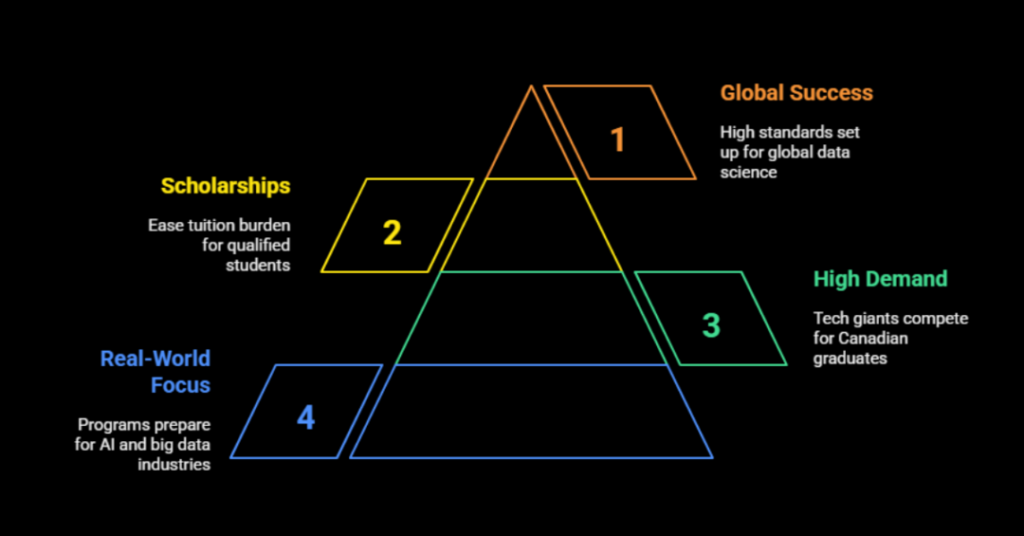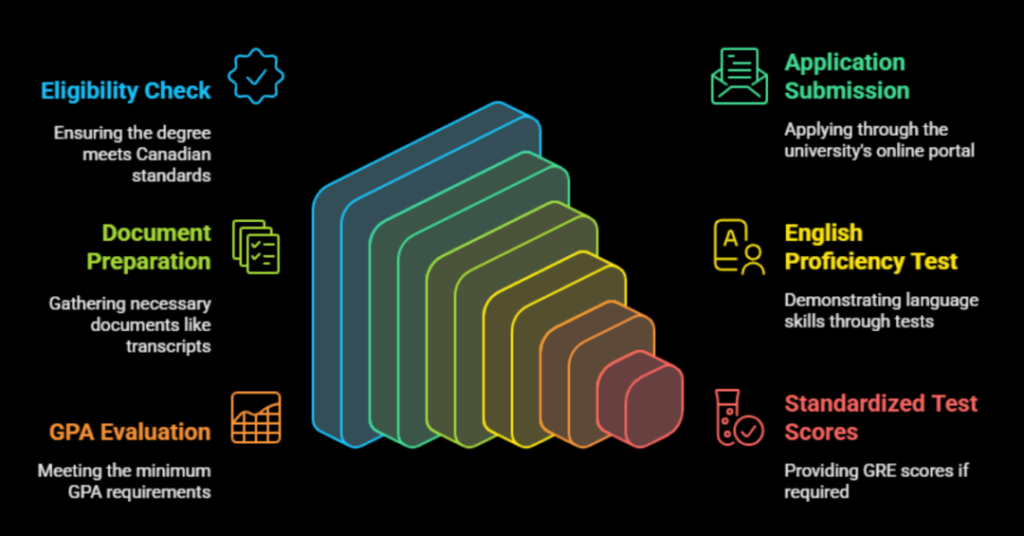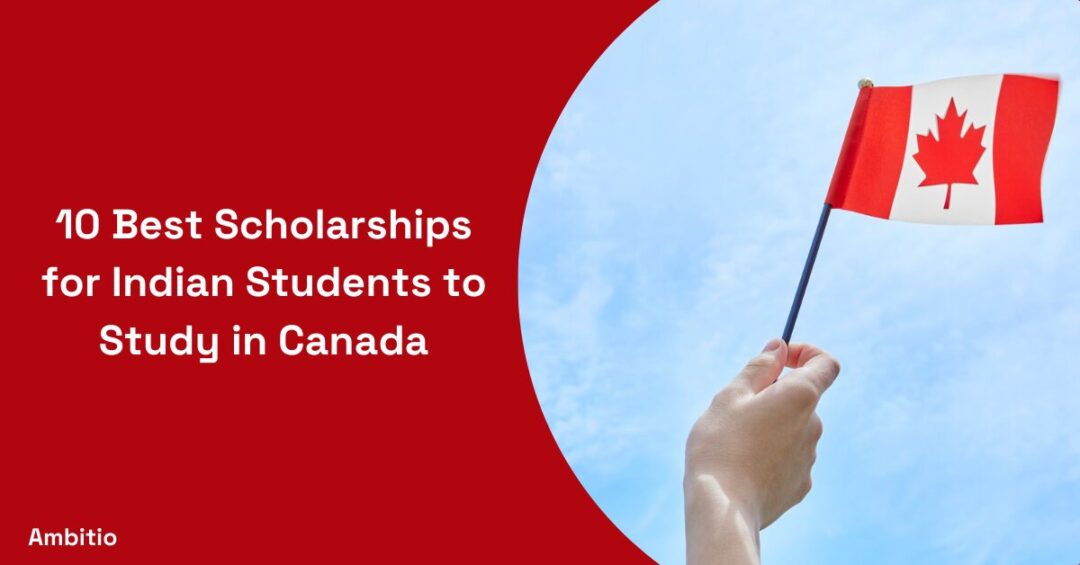10 June 2025
6 minutes read
How To Pursue Masters In Data Science And Analytics In Canada As An Indian Student: A Complete Guide

Key Takeaways
- Masters in data science in Canada offer real-world exposure, with top programs preparing graduates for careers in AI, big data, and analytics.
- Canadian universities emphasize practical experience, internships, and networking opportunities to enhance career prospects in data science.
- Scholarships like the Vanier Canada Graduate Scholarships can significantly reduce the financial burden of pursuing a Master’s degree.
In 2023, Canada saw over 15,000 international students enrolling in Master of Data Science programs, but for Indian students, it’s not just about acing test scores. The competition is fierce, and navigating the admission requirements can feel like a maze. However, by understanding the specific entry criteria and leveraging scholarships, you can confidently secure your place in a top data science program in Canada.
Why Should You Pursue Masters In Data Science In Canada?
Well, let’s be real – it’s not just about sitting in a classroom and pretending to understand machine learning. It’s about being part of a revolution where AI, big data, and analytics are shaping every major industry. If you’re serious about making waves in the tech world, you better start thinking about the real value these programs bring, not just the fancy degree. Ready for the truth?

Here’s why Canada’s a no-brainer for data science:
- Canadian data science programs are designed with a strong real-world focus, preparing graduates to dive straight into industries like AI and big data.
- The demand for data scientists and data analytics experts is soaring, with tech giants and startups competing to hire graduates from Canadian universities.
- Scholarships are available for qualified students, easing the burden of tuition while helping you focus on becoming an expert in data analysis and data visualization.
- With high English language proficiency standards and admission requirements that favor well-rounded applicants, Canada sets you up for success in the global data science sector.
- Canadian universities emphasize machine learning and computer science, equipping you with the skills to compute insights from complex data sets and apply them to real-world challenges.
12 Top Universities To Pursue Master Of Data Science Program In Canada As International Students
A few years back, Canadian universities received a record number of applications for data science programs, with international students vying for a place in some of the most prestigious institutions. Why? Because a Master of Data Science in Canada is more than just a degree—it’s the key to unlocking doors in the booming fields of artificial intelligence, big data, and machine learning. But here’s the kicker: not all programs are created equal.
Here are the top universities that offer world-class Master of Science degrees in data science and set you up for a future in one of the most lucrative industries worldwide.
| University | Average Tuition Fees (CAD) | Average Salary Post Graduation (CAD) | Documents & Exam Requirements |
|---|---|---|---|
| University of Toronto | 40,000 | 85,000 | GPA 3.2, IELTS 6.5+, GRE (recommended), Bachelor’s in CS/Math |
| University of British Columbia | 30,000 | 80,000 | GPA 3.0, TOEFL 90+, GRE (recommended), Bachelor’s in CS/Math |
| McGill University | 32,000 | 83,000 | GPA 3.0, IELTS 6.5+, GRE (recommended), Bachelor’s in CS/Math |
| University of Alberta | 25,000 | 75,000 | GPA 3.0, TOEFL 100+, GRE (recommended), Bachelor’s in CS/Math |
| University of Waterloo | 35,000 | 90,000 | GPA 3.3, IELTS 6.5+, GRE (recommended), Bachelor’s in CS/Math |
| Simon Fraser University | 28,000 | 78,000 | GPA 3.0, TOEFL 90+, GRE (recommended), Bachelor’s in CS/Math |
| Western University | 40,000 | 85,000 | GPA 3.0, IELTS 6.5+, GRE (recommended), Bachelor’s in CS/Math |
| Queen’s University | 36,000 | 80,000 | GPA 3.2, TOEFL 100+, GRE (recommended), Bachelor’s in CS/Math |
| Dalhousie University | 30,000 | 70,000 | GPA 3.0, IELTS 6.5+, GRE (recommended), Bachelor’s in CS/Math |
| University of Montreal | 28,000 | 74,000 | GPA 3.0, TOEFL 90+, GRE (recommended), Bachelor’s in CS/Math |
| York University | 35,000 | 82,000 | GPA 3.0, IELTS 6.5+, GRE (recommended), Bachelor’s in CS/Math |
| Carleton University | 32,000 | 75,000 | GPA 3.0, TOEFL 100+, GRE (recommended), Bachelor’s in CS/Math |
What Is The Admission Requirements For Masters In Canada?
With data science and analytics being a highly competitive field, international students are flooding Canadian universities in hopes of cracking the big data code. But here’s the deal: getting in isn’t as simple as it sounds. From data management to real-world application of data science, the requirements for the program vary significantly depending on which university or college you’re eyeing.

Let’s break it down for you, so you can navigate through it like a pro.
| Step | Details |
|---|---|
| Eligibility Requirements | To be eligible for a Master of Science in Data Science or Master’s program in Canada, students must have a bachelor’s degree in a related field like statistics or computer science. International credentials need to be evaluated for equivalency to Canadian standards. |
| Application Process | Prospective students must apply through the university offers online portal. Some institutions like the University of Toronto may have specific deadlines for international students. |
| Application Documents | Required documents include a completed application form, transcripts, a diploma in data science (if applicable), a personal statement, a statement of purpose, and two letters of recommendation. Some data science colleges in Canada may also require a CV. |
| English Proficiency Test | International students must demonstrate English proficiency through tests like TOEFL, IELTS, or equivalent. Some data science courses in Canada accept specific score bands. |
| GPA Requirements | QS World University Rankings and best data science programs usually require a minimum GPA of 3.0 or equivalent, depending on the program and university. |
| Standardized Test Scores | Some top universities in Canada may require GRE exam scores, especially for applicants without a degree program in a directly related field. However, some may waive this for data science and analytics students with relevant experience. |
| Work Experience | Many universities encourage students to develop practical skills through work experience. Career in data science often requires knowledge of complex data sets and working knowledge of statistics. |
| Duration of the Program | Duration of the program typically lasts 1-2 years, depending on whether you’re studying full-time or part-time. Some universities also offer accelerated options in data science fields. |
| Cost of Studying MS in Data Science | The cost of studying MS in Canada varies, with cost of living ranging from CAD 10,000 to 15,000 annually. International students should also consider the cost of data science colleges in Canada, which can range between CAD 20,000 to 50,000 per year. |
What Are The Available Scholarships To Study Masters In Canada?
Money is something we all wish grew on trees, but since it doesn’t, here’s the next best thing: scholarships. Especially when you’re looking at studying a Master’s program in Canada, where the cost of living and tuition fees can make your wallet cry. But don’t panic just yet—there are plenty of scholarships available for Indian students that can make studying in Canada a lot more affordable. Let’s dive into the top five scholarships that could help ease your financial burden and unlock opportunities to study in one of the best data science and analytics programs.
| Scholarship Name | Amount | Eligibility | Application Process |
|---|---|---|---|
| Vanier Canada Graduate Scholarships | Up to CAD 50,000 per year | For international students applying for a Master of Science or Master of Data Science program | Application through the university; must be nominated by the institution |
| Ontario Graduate Scholarship | CAD 15,000 per year | Available for Indian students in Master’s programs in Ontario universities like the University of Toronto | Apply directly to the university in Ontario; includes academic excellence criteria |
| Lester B. Pearson International Scholarship | Full tuition, books, and living expenses | Awarded to top international students pursuing graduate studies at the University of Toronto | Apply through the University of Toronto; requires academic excellence and extracurricular involvement |
| Canadian Commonwealth Scholarship Program | Covers full tuition, travel expenses, and living allowance | For students from Commonwealth countries (including India) applying to a Master’s program in Canada | Apply through the Canadian embassy in your home country |
| Trudeau Foundation Scholarships | Up to CAD 60,000 per year | For students pursuing doctoral studies in Canada, but some programs may allow for Master’s programs | Apply directly through the Trudeau Foundation; must have strong leadership potential |
What Is The Cost Of Studying MS In Data Science In Canada?
Now, what it can cost you to study MS in Data Science in Canada can make your jaw drop faster than an algorithm analyzing a complex data set. Between tuition fees, living expenses, and the cost of studying MS, it’s easy to feel overwhelmed. But fear not—let’s break down the real cost so you can budget like a pro and get ready to tackle both your academic and financial goals without falling off the cliff.
Here’s the breakdown
| Expense | Estimated Cost (CAD) | Details |
|---|---|---|
| Tuition Fees | CAD 20,000 – 50,000 per year | Varies by university and program (e.g., University of Toronto tends to be on the higher end). |
| Living Expenses | CAD 10,000 – 15,000 per year | Includes accommodation, food, and personal expenses. Costs vary by city (e.g., Toronto is higher). |
| Health Insurance | CAD 600 – 1,000 per year | Mandatory for international students in most provinces. |
| Books and Supplies | CAD 500 – 1,500 per year | Depends on the program and specific data science courses in Canada. |
| Miscellaneous Expenses | CAD 1,000 – 2,000 per year | Includes transportation, entertainment, and other personal costs. |
Conclusion
While the cost and competition can seem daunting, the opportunities that follow—whether through scholarships, top-tier universities, or real-world experience—make it all worthwhile. As you plan your journey, remember this: it’s not just about the numbers on paper, but about how you can turn your skills into a career that impacts industries and innovates the way we use data. Whether you’re analyzing massive datasets or building predictive models, Canada offers you the education, environment, and connections you need to thrive in the data-driven world.
To get into a top Canadian university, you need more than just good grades—you need a game plan. Ambitio’s AI-powered platform and expert consultants guide you through every step, from choosing the right university to securing study permits and work opportunities. No guesswork, no wasted time—just a clear, structured path to studying in Canada. If you’re ready to make studying in Canada a reality, Ambitio is your best bet.
FAQs
What is the typical duration of a Master’s in Data Science in Canada?
Most programs last 1 to 2 years and can be pursued full-time or part-time
What are the admission requirements?
You need a bachelor’s degree in a related field (e.g., Computer Science, Mathematics, Statistics), a minimum GPA (often 3.0 on a 4.0 or 4.33 scale), and proof of English proficiency (e.g., IELTS 6.5 or above)
Is GRE or GMAT required?
Some universities require GRE or GMAT scores, but this varies by institution
How much does it cost to study MS in Data Science in Canada?
Tuition fees for international students typically range from CAD 20,000 to CAD 40,000 per year, but some top universities may cost more
Are scholarships available for international students?
Yes, there are government-funded, university-specific, and privately funded scholarships available
What is the average salary for a Data Scientist in Canada?
Entry-level data scientists earn around CAD 59,000, while experienced professionals can earn up to CAD 80,349 or more, with top earners reaching CAD 298,000

You can study at top universities worldwide!
Get expert tips and tricks to get into top universities with a free expert session.
Book Your Free 30-Minute Session Now! Book a call now




























